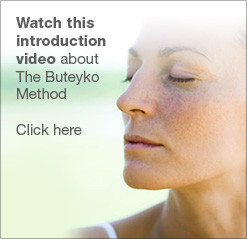Asthma sufferers in Scotland yesterday hailed a controversial Russian breathing technique that is currently confounding established medical opinion.
The little-known Buteyko method, currently being used by a group of 40 asthmatics, is showing remarkable results. Two months after a week-long Buteyko course costing pounds 295 per head most of the group had reduced their medication dramatically and were able to control their asthma attacks.
‘It’s been a very interesting experience, hard but very helpful, ‘ said 77-year-old Anne Kemp, from Milngavie, near Glasgow. ‘Before, my breath would catch all the time and I couldn’t even walk back up the hill to the shops without getting out of breath, and I would take Ventolin and steroids to counteract that.
‘Two months is not a long time to make a big statement about it, but I think it has been of benefit to me.’
Thirteen-year-old Donna Esslemont, from Eaglesham, outside Glasgow, has also been helped by the programme.
‘I think it has worked. I do all the breathing exercises every day and I am getting better and better, ‘ she said. ‘I can do a lot more sport and play with my friends without having to worry about an attack, and I am using less drugs.’ Buteyko practitioner Alexander Stalmatski says the technique works because asthmatics breath more than they should do. ‘The degree of over-breathing determines the severity of the asthma and by improving breathing we can improve asthma, ‘ he added.
However, despite the seemingly high rates of success, the majority of doctors remain sceptical and both the medical profession and the National Asthma Campaign are concerned that people will stop taking their medication.According to a BBC Scotland Frontline investigation being screened tonight, about 1,500 people die from the disease in the United Kingdom every year, and there are an estimated three million sufferers. The number of children admitted to hospital with asthma has increased fourfold since the 1980s and there is no known cure and no known cause.
The only treatment is increasingly higher doses of drugs such as Ventolin and steroids. Last year the health service spent nearly pounds 500 million on these drugs, 70 per cent up in the previous six years.
Dr Gerald Spence, a GP at Shettleston in Glasgow, says his practice spends 19 per cent of its budget on asthma drugs and he is now taking a serious look at the alternatives.
‘There does seem to be an inexorable increase in the use of these drugs over the years. It was because we seem to be having to up the ante all the time that I decided to take a look at an alternative, ‘ he said.
‘I must admit I was flabbergasted by it because it is so simple and so easy. I felt uncomfortable because for years I have been prescribing drugs in increasing amounts, and this breathing technique provides a great deal of relief.’
Dr Spence has now decided to conduct tests of the technique at his practice with a view to paving the way for proper clinical trials.
